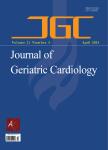Prospective evaluation of health status, quality of life and clinical outcomes following implantable defibrillator generator exchange
Prospective evaluation of health status, quality of life and clinical outcomes following implantable defibrillator generator exchange作者机构:Section of Cardiac ElectrophysiologyEmory University School of MedicineAtlantaGAUSA Department of MedicineUniversity of Michigan School of MedicineAnn ArborMIUSA Grady Health SystemAtlantaGAUSA
出 版 物:《Journal of Geriatric Cardiology》 (老年心脏病学杂志(英文版))
年 卷 期:2021年第18卷第9期
页 面:720-727页
核心收录:
学科分类:1002[医学-临床医学] 100210[医学-外科学(含:普外、骨外、泌尿外、胸心外、神外、整形、烧伤、野战外)] 10[医学]
基 金:supported by a Pilot Translational&Clinical Studies Program grant from the National Center for Advancing Translational Studies of the National Institutes of Health(UL1TR002378) a FAME grant from the Emory University Department of Medicine
主 题:ICD quality of life and clinical outcomes following implantable defibrillator generator exchange Prospective evaluation of health status
摘 要:BACKGROUND Little is known about health status and quality of life(QoL)after implantable cardioverter-defibrillator(ICD)generator exchange(GE).METHODS We prospectively followed patients undergoing first-time ICD *** assessments of health status were performed by administering the 36-Item Short Form Survey(SF-36).RESULTS Mean age was 67.5±14.3 years,left ventricle ejection fraction(LVEF)was 36.5%±15.0%and over 40%of the cohort had improved LVEF to35%at the time of ***-36 scores were significantly worse in physical/general health domains compared to domains of emotional/social well-being(P0.001 for each comparison).Physical health scores were significantly worse among those with medical comorbidities including diabetes,chronic obstructive pulmonary disease and atrial *** follow-up was 1.6±0.5 years after *** SF-36 scores remained stable across all domains during *** at 3 years post-GE was estimated at 80%.Five patients died during follow-up and most deaths were adjudicated as non-arrhythmic in *** patients experienced appropriate ICD shocks after GE,three of whom had LVEF which remains impaired LVEF(i.e.,35%)at the time of *** Patients undergoing ICD GE have significantly worse physical health compared to emotional/social well-being,which is associated with the presence of medical *** terms of clinical outcomes,the incidence of appropriate shocks after GE among those with improvement in LVEF is very low,and most deaths post-procedure appear to be non-arrhythmic in *** data represent an attempt to more fully characterize the spectrum of QoL and clinical outcomes after GE.



